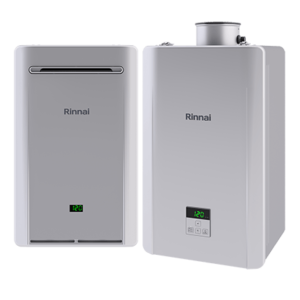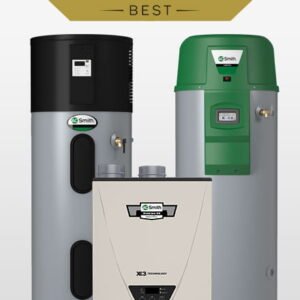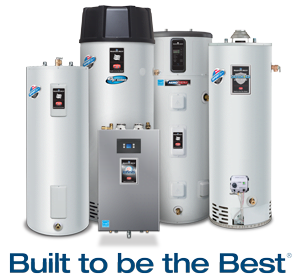The battle between tankless water heater vs tank water heaters has been going on for years, with homeowners weighing the pros and cons of each type. As energy efficiency and sustainability become increasingly important, many people are reevaluating their water heating systems and considering making the switch to a more efficient option. In this article, we will discuss the differences between these two water heating methods to help you make an informed decision.
Tankless water heaters, also known as on-demand or instantaneous water heaters, provide hot water as it is needed by heating water directly without the use of a storage tank. This eliminates the need for standby heat loss and leads to increased energy efficiency. The U.S. Department of Energy estimates that tankless models are between 24% and 34% more efficient if you use less than 41 gallons of hot water per day. On the other hand, traditional storage tank water heaters store a large volume of heated water, which can result in some energy loss due to standby heat loss.
While tankless water heaters are more efficient, their higher upfront costs (ranging from $1,000 to $3,000) and installation expenses (at least $800) can deter some homeowners from making the switch. In comparison, storage tank water heaters cost $300 to $2,000 and have lower installation costs. Ultimately, understanding the differences in efficiency, cost, and performance between these two water heating options will help you determine the best system for your home.
Benefits of Tankless Water Heaters
On-Demand Hot Water
One of the primary advantages of tankless water heaters is that they provide on-demand hot water. Unlike traditional tank water heaters, which store a limited amount of pre-heated water, tankless heaters heat water as you need it. This means you get endless hot water without having to wait for the tank to replenish. This eliminates the inconvenience of running out of hot water during peak usage times.
Energy Savings
Tankless water heaters are known for their energy efficiency. According to the U.S. Department of Energy, tankless models can be between 24% and 34% more efficient if you use less than 41 gallons of hot water each day. This is because traditional tank heaters continuously heat water, even when not in use, resulting in higher energy costs. In contrast, tankless heaters only consume energy when you turn on the hot water tap. Additionally, many tankless water heaters are Energy Star certified, indicating that they meet stringent energy efficiency requirements set by the Environmental Protection Agency. Some of the ways tankless heaters save energy include:
- Lower standby energy losses, as there is no stored hot water to keep heated
- Longer life expectancy, meaning less wasted energy and resources
- Optional remote controls that allow you to adjust the temperature settings for optimal efficiency
Space Savings
Another benefit of tankless water heaters is their compact size. Traditional tank water heaters can take up significant floor space due to the large storage tank. Tankless heaters, however, are much smaller and can be mounted on a wall, freeing up valuable space in your home. This makes them an ideal choice for smaller homes, apartments, or when you want to maximize usable space. Additionally, tankless heaters are easier to install in tight spaces, such as closets or crawl spaces, due to their smaller dimensions.
Benefits of Storage Tank Water Heaters
Storage tank water heaters have been a popular choice for homeowners due to their capacity, affordability, and ease of installation. Below, we’ll discuss some of the advantages of storage tank water heaters compared to tankless water heaters, focusing on the lower initial cost and easier installation process.
Lower Initial Cost
One major advantage of storage tank water heaters is that they are generally less expensive than tankless models. The purchase price for tank-style water heaters is lower, making it an attractive choice for budget-conscious individuals. For example, the cost of electric and gas storage tank water heaters typically ranges around $570 and $600, respectively, for a 50-gallon Rheem model. While tankless water heaters offer greater energy efficiency, the storage tank units’ lower upfront cost can be a deciding factor for many homeowners.
Easier Installation
Another benefit of storage tank water heaters is the simplicity of their installation process. Traditional water heater installation typically costs around $500. This is significantly lower than the cost of installing a tankless water heater, which can be double or more. Storage tank water heaters are often easier to install because there is less complexity involved in their design and function.
The ease of installation also comes from the fact that storage tank water heaters often have fewer requirements for insulation and venting. These water heaters typically don’t demand extensive modifications to a home’s plumbing configuration or structure, saving homeowners both time and money on installation.
Capacity: One of the main selling points of storage tank water heaters is their capacity. These types of water heaters can hold a large amount of hot water, typically ranging from 30 to 80 gallons. This means that plenty of heated water is available on demand for a family’s daily needs, such as washing dishes, showering, and laundry.
By considering the benefits of storage tank water heaters, such as lower initial cost and easier installation, homeowners can make a more informed decision about which type of water heater best suits their needs.
Tankless Water Heater vs Tank: Comparing Performance and Efficiency
Standby Heat Loss
Standby heat loss refers to the heat that escapes from the tank of a traditional tank water heater over time when not in use. This loss of heat energy is an inefficiency that tankless water heaters can reduce or eliminate due to their on-demand heating design. For example, heat pump water heaters are known for reducing standby heat loss by extracting heat from the surrounding air or ground, making them an energy-efficient option.
Traditional tank water heaters can be insulated to mitigate standby heat loss to some extent. However, this still won’t make them as energy-efficient as tankless systems, which operate without the need for a storage tank.
Energy Usage
The energy efficiency of water heaters is an important factor in comparing their overall performance. Tankless water heaters typically offer improved energy efficiency over traditional storage tank water heaters, as they only heat water when required, avoiding the energy waste associated with keeping a large tank of water heated all the time. The U.S. Department of Energy (DOE) estimates that tankless water heaters are about 8% to 34% more efficient than their storage tank counterparts, depending on the amount of hot water used.
Traditional tank water heaters:
- Are generally less efficient due to standby heat loss
- Require constant energy to maintain the temperature of stored water
- Can be used with boilers in some cases
- Provide on-demand hot water without the standby heat loss issue
- Consume energy only when hot water is needed, making them more energy-efficient
- Often labeled as “energy saver” options
In summary, when comparing the performance and efficiency of tankless water heaters and traditional tank water heaters, it is crucial to consider factors such as standby heat loss and energy usage. Tankless water heaters typically offer better efficiency due to their on-demand heating design, which reduces standby heat loss and only consumes energy when hot water is needed. This can result in long-term savings, improved performance, and a smaller environmental impact.
Installation and Maintenance
DIY vs Professional Installation
When it comes to installing a water heater, there are two options: DIY installation or hiring a professional. For traditional tank water heaters, DIY installation is possible for those who have experience with plumbing and electrical work. However, even for experienced DIYers, tankless water heater installation can be more complex and may require additional steps like new wiring and plumbing changes. That’s why it’s generally recommended to hire a professional for tankless water heater installation.
Installation costs for traditional tank water heaters typically run around $500, whereas tankless installation costs can double that or more. Here are some considerations for both types of installation:
- DIY Installation:
- May save money on labor costs
- Requires knowledge of plumbing and electrical systems
- Can be time-consuming for inexperienced individuals
- Professional Installation:
- More expensive, especially for tankless water heaters
- Ensures proper installation, minimizing the risk of future issues
- May be required to maintain warranty (check with the manufacturer)
Warranty and Support
Water heater warranties and support options vary depending on the manufacturer and model. It’s crucial to carefully review the warranty terms and conditions to ensure you’re getting the best protection for your investment. Some common points to look for in a warranty include:
- Length of warranty: The duration of the warranty can differ among manufacturers, ranging from a few years to a lifetime warranty.
- Coverage: Warranties often cover specific components like the heat exchanger, internal parts, and labor for repairs. Be sure to check if the warranty covers everything or only certain parts.
- Transferability: Some warranties can be transferred to a new homeowner if you sell your house, while others may not allow transfers.
Keep in mind that improper installation, such as DIY installations when professional installation is required by the manufacturer, can void the warranty. Always follow the manufacturer’s guidelines and work with a certified professional if needed to ensure that you maintain your warranty coverage.
In the end, for both installation and maintenance, the choice between a tankless or a tank water heater depends on your unique needs, preferences, and budget. Whichever type you choose, make sure you get the appropriate support and follow the appropriate guidelines to ensure the water heater works efficiently and effectively.
Choosing the Right Water Heater
Consider Your Usage Patterns
When choosing between a tankless water heater and a tank storage water heater, it’s important to consider how much hot water you typically use in a day. Think about the appliances in your home that require hot water, such as the dishwasher and washing machine, as well as daily activities like showering and washing dishes.
Tankless water heaters are more energy-efficient than tank storage water heaters, with the U.S. Department of Energy estimating that they are 24% to 34% more efficient for households using less than 41 gallons of hot water daily. If your household’s hot water usage falls within this range, a tankless water heater may be the better option for you.
Fuel Source
Another factor to consider is the fuel source for your water heater. Both tankless and tank storage water heaters can be powered by electricity, natural gas, or propane. The availability and cost of these fuel sources in your area can influence your decision. For example, if natural gas is readily available and affordable, a gas-powered tankless water heater might be a more cost-effective solution in the long run.
Utility Bills
Although tankless water heaters often have a higher initial cost ($525 to $1,150) compared to tank storage water heaters ($300 to $2,000), their energy savings can offset this expense over time. With lower energy consumption, your utility bills can be reduced when using a tankless water heater.
Moreover, the energy savings from a tankless water heater can depend on the brand and model you choose. For instance, Navien is a popular brand known for its highly efficient tankless water heaters.
In conclusion, when choosing the right water heater, it’s essential to consider your daily hot water usage, available fuel sources, and utility bills. Keep in mind both the initial cost and the long-term energy savings to make an informed decision that best suits your household’s needs.
Popular Brands and Models
When it comes to selecting the right water heater for your home, it’s important to be aware of the popular brands and models available on the market. Here, we’ll discuss some of the well-known options in both tankless and tank water heaters.
Tankless Water Heaters
Rinnai: This brand offers a wide range of tankless water heaters, with the Rinnai RU160iN RU Model Series being a prominent choice. These heaters are known for their energy efficiency and high flow rates.

Rheem: Another well-regarded brand in the tankless water heater market, Rheem has a variety of models to choose from. The Rheem 13kw Tankless Electric Water Heater RTEX-13 is a popular choice known for its easy installation and compact size.

Stiebel Eltron: This brand is known for its point-of-use electric tankless water heaters, such as the Stiebel Eltron DHC Trend. These smaller units are ideal for providing hot water in specific areas of your home, like a single sink or shower.
Eemax: The Eemax 27kW Electric Tankless is another highly-rated model. This unit boasts a self-modulating technology that adjusts the power output according to water flow, reducing energy consumption.

Tank Water Heaters
A.O. Smith: A renowned brand in the tank water heater industry, A.O. Smith has a range of models to suit different needs. Their Signature Series includes both gas and electric water heaters that offer great energy efficiency and durability.

Whirlpool: Known for its household appliances, Whirlpool also manufactures reliable and efficient tank water heaters. The Whirlpool 40-Gallon Energy Smart Electric Water Heater is a popular option with a built-in energy management system.

Bradford White: Bradford White offers a variety of tank water heaters, including the highly-regarded Defender Safety System series. These units feature advanced technologies to ensure safe and efficient operation.

When choosing the right water heater for your home, it’s essential to consider factors like energy efficiency, flow rate, and installation requirements. By understanding the popular brands and models available, you’ll be better equipped to make an informed decision.


